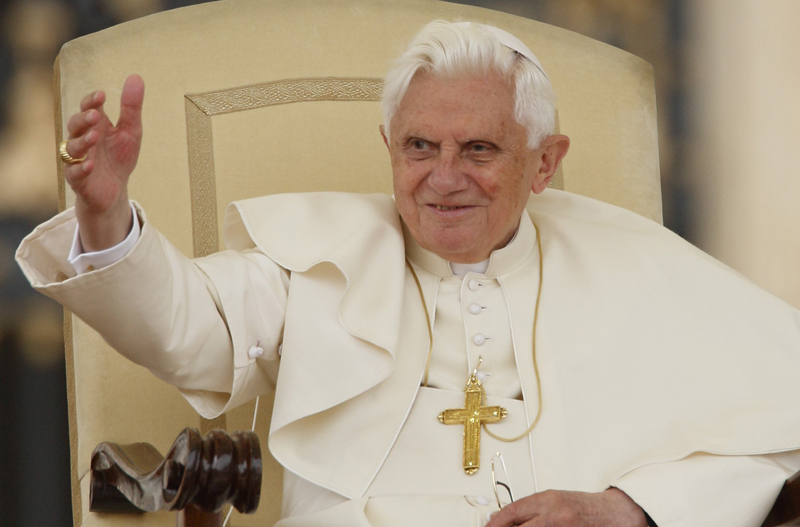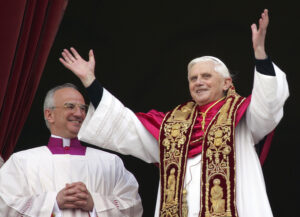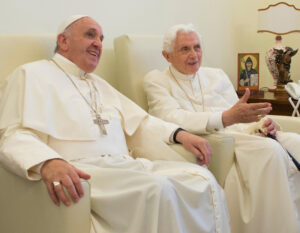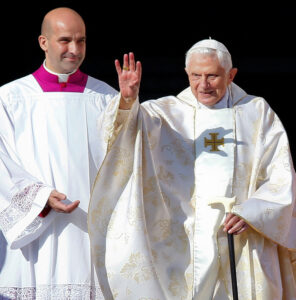Pope Benedict dies: Eight years as pope capped long ministry as teacher of faith

Pope Benedict XVI acknowledges pilgrims during his general audience in St. Peter's Square at the Vatican Nov. 4, 2009. Pope Benedict died Dec. 31, 2022, at the age of 95 in his residence at the Vatican. (CNS photo/Paul Haring)
VATICAN CITY (CNS) — Retired Pope Benedict XVI, who had an impressive record as a teacher and defender of the basics of Catholic faith, is likely to go down in history books as the first pope in almost 600 years to resign.
He died Dec. 31 at the age of 95, nearly 10 years after leaving the papacy to retire to what he said would be a life of prayer and study.
Pope Francis was scheduled to celebrate his predecessor’s funeral Jan. 5 in St. Peter’s Square. Matteo Bruni, director of the Vatican press office, said the funeral rites would be simple in keeping with the wishes of the late pope.
As the retired pope neared death, he was given the anointing of the sick Dec. 28 in his residence, Bruni said.
His body was to lie in St. Peter’s Basilica beginning Jan. 2 so that people could pay their respects and offer their prayers, he said.
“His legacy is a remarkable testament of the teaching and preaching of the truth of Jesus Christ,” Bishop Louis Tylka said in a statement issued this morning. “We are grateful for his witness of faith, placing his life completely in the hands of God.”
Bishop Tylka encouraged prayers in gratitude for the life of the retired pope, as well as prayers that he may now rest in peace.
BUSY PAPACY
A close collaborator of St. John Paul II and the theological expert behind many of his major teachings and gestures, Pope Benedict came to the papacy after 24 years heading the doctrinal congregation’s work of safeguarding Catholic teaching on faith and morals, correcting the work of some Catholic theologians and ensuring the theological solidity of the documents issued by other Vatican offices.

Pope Benedict XVI appears on the central balcony of St. Peter’s Basilica at the Vatican after his election April 19, 2005. (CNS photo/Max Rossi, Reuters)
As pope, he continued writing as a theologian, but also made historically important gestures to Catholics who had difficulty accepting all of the teachings of the Second Vatican Council, particularly about the liturgy. In 2007, he widened permission to use the “extraordinary” or pre-Vatican II form of the Mass and, a short time later, extended a hand to the traditionalist Society of St. Pius X. Besides lifting the excommunications of four of the society’s bishops who were ordained illicitly in 1988, he launched a long and intense dialogue with the group. In the end, though, the talks broke down.
His papacy, which began when he was 78, was extremely busy for a man who already had a pacemaker and who had wanted to retire to study, write and pray when he turned 75. He used virtually every medium at his disposal — books and Twitter, sermons and encyclicals — to catechize the faithful on the foundational beliefs and practices of Christianity, ranging from the sermons of St. Augustine to the sign of the cross.
Pope Benedict was the first pope to meet with victims of clerical sexual abuse. He clarified church laws to expedite cases and mandated that bishops’ conferences put in place stringent norms against abuse.
HISTORIC VISIT TO U.S.
Although he did not expect to travel much, he ended up making 24 trips to six continents and three times presided over World Youth Day mega-gatherings: in Germany in 2005, Australia in 2008, and Spain in 2011.
On a historic visit to the United States in 2008, the pope brought his own identity into clearer focus for Americans. He set forth a moral challenge on issues ranging from economic justice to abortion. He also took church recognition of the priestly sex-abuse scandal to a new level, expressing his personal shame at what happened and personally praying with victims.
While still in his 30s, he served as an influential adviser during the Second Vatican Council, 1962-65, and as pope, he made it a priority to correct what he saw as overly expansive interpretations of Vatican II in favor of readings that stressed the council’s continuity with the church’s millennial traditions.
Under his oversight, the Vatican continued to highlight the church’s moral boundaries on issues such as end-of-life medical care, marriage and homosexuality. But the pope’s message to society at large focused less on single issues and more on the risk of losing the basic relationship between the human being and the Creator.
RELIGION OF LOVE
Surprising those who had expected a by-the-book pontificate from a man who had spent so many years as the Vatican’s chief doctrinal official, Pope Benedict emphasized that Christianity was a religion of love and not a religion of rules.
The German-born pontiff did not try to match the popularity of St. John Paul, but the millions of people who came to see him in Rome and abroad came to appreciate his smile, his frequent ad-libs and his ability to speak from the heart.
Some of Pope Benedict’s most memorable statements came when he applied simple Gospel values to social issues such as the protection of human life, the environment and economics. When the global financial crisis worsened in 2008, for example, the pope insisted that financial institutions must put people before profits. He also reminded people that money and worldly success are passing realities, saying: “Whoever builds his life on these things — on material things, on success, on appearances — is building on sand.”
He consistently warned the West that unless its secularized society rediscovered religious values, it could not hope to engage in real dialogue with Muslims and members of other religious traditions.
In his encyclicals and in his books on “Jesus of Nazareth,” the pope honed that message, asking readers to discover the essential connections between sacrificial love, works of charity, a dedication to the truth and the Gospel of Christ.
“A VERY WISE GRANDFATHER” FIGURE
The retired pope looked in-depth at his papacy and resignation, his relationships with St. John Paul and Pope Francis and a host of other issues in “Last Testament,” a book-length interview with journalist Peter Seewald published in 2016.

Pope Francis chats with retired Pope Benedict XVI at the retired pope’s home in the Mater Ecclesiae monastery at the Vatican June 30, 2015. (CNS photo/L’Osservatore Romano)
In the book, Pope Benedict insisted once again that he was not pressured by anyone or any event to resign and he did not feel he was running away from any problem. However, he acknowledged “practical governance was not my forte, and this certainly was a weakness.”
Insisting “my hour had passed, and I had given all I could,” Pope Benedict said he never regretted resigning, but he did regret hurting friends and faithful who were “really distressed and felt forsaken” by his stepping down.
Less than a month after resigning, he already looked frailer and walked with noticeably more difficulty than he did when he left office. The video images released by the Vatican March 23, 2013, when his successor, Pope Francis, visited him at Castel Gandolfo underscored the “diminishing energy” Pope Benedict had said led to his resignation.
Pope Benedict moved to the papal summer villa at Castel Gandolfo Feb. 28, 2013, the day his resignation took effect. He remained at the villa south of Rome for two months — a period that included the conclave that elected Pope Francis as his successor and the first month of the new pope’s pontificate. The retired pope moved back to the Vatican May 2, 2013, living in a monastery remodeled as a residence for him, his secretary and the consecrated women who cared for his household before and after his resignation.
On his only post-retirement trip outside of Italy, he flew to Germany in June 2020 for a five-day visit with his ailing 96-year-old brother.
Answering questions from reporters on a flight back from Brazil in July 2013, Pope Francis spoke with admiration of the retired pope’s humility, intelligence and prayerfulness. The unusual situation of having a pope and a retired pope both living at the Vatican was working out very well, Pope Francis said. Having the retired pope nearby to consult with, or ask questions of, Pope Francis said, was “like having a grandfather at home — a very wise grandfather.”
REPUTATION AS THEOLOGIAN
Joseph Ratzinger was born April 16, 1927, in the Bavarian town of Marktl am Inn, the third and youngest child of a police officer, Joseph Sr., and his wife, Maria. Young Joseph joined his brother, Georg, at a minor seminary in 1939.

Retired Pope Benedict XVI waves as he arrives to attend Mass in St. Peter’s Square at the Vatican Oct. 19, 2014. (CNS photo/Tony Gentile, Reuters)
Like other young students in Germany at the time, he was automatically enrolled in the Hitler Youth program, but soon stopped going to meetings. During World War II, he was conscripted into the army, and in the spring of 1945, he deserted his unit and returned home, spending a few months in an Allied prisoner-of-war camp. He returned to the seminary late in 1945 and was ordained six years later, along with his brother.
After a short stint as a parish priest, the future pope began a teaching career and built a reputation as one of the church’s foremost theologians. At Vatican II, he made important contributions as a theological expert and embraced the council’s early work. But he began to have misgivings about an emerging anti-Roman bias, the idea of a “church from below” run on a parliamentary model, and the direction of theological research in the church — criticism that would become even sharper in later years.
In a 2005 speech that served as a kind of manifesto for his young papacy, Pope Benedict rejected what he called a “hermeneutic of discontinuity and rupture” in interpreting Vatican II as a radical break with the past. The pope called instead for reading the council through a “hermeneutic of reform” in continuity with Catholic tradition.
In 1977, St. Paul VI named him archbishop of Munich and Freising and, four years later, Pope John Paul called him to head the Congregation for the Doctrine of the Faith, where he wielded great influence on issues such as liberation theology, dissent from church teachings and pressure for women’s ordination. Serving in this role for nearly a quarter century, then-Cardinal Ratzinger earned a reputation in some quarters as a sort of grand inquisitor, seeking to stamp out independent thinking, an image belied by his passion for debate with thinkers inside and outside the church.
As the newly elected pope in 2005, he explained that he took the name Benedict to evoke the memory of Pope Benedict XV, a “courageous prophet of peace” during World War I, and said he wanted to place his ministry at the service of reconciliation and harmony among peoples.
Like his namesake and his predecessors, he was untiring in his appeals for an end to violence in world trouble spots and for dialogue as the only true and lasting solution to conflict. Another key to building a better world, he said repeatedly, is to respect the right of each person to seek and to worship God.
—
EDITOR’S NOTE: A full obituary and more stories about the life of Pope Emeritus Benedict XVI will be published in the Jan. 8, issue of The Catholic Post, the first issue of 2023.





